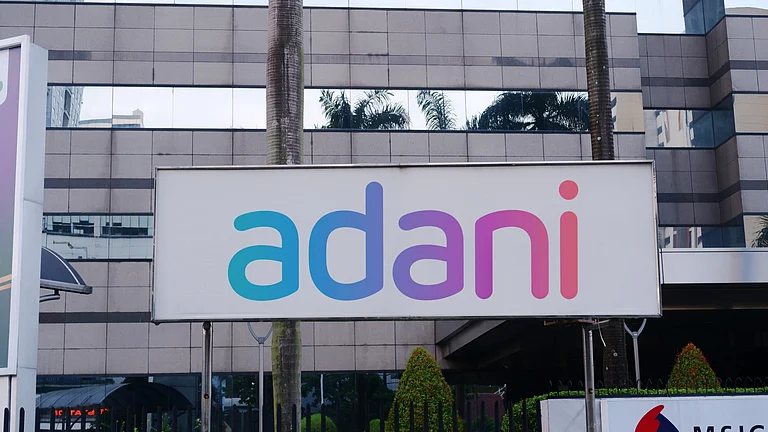A little over a week ago, Gautam Adani was in news for his views on ChatGPT and his group’s plans to enter new business segments. The markets were anticipating the follow-on public offering (FPO) of his flagship company—the Adani Enterprises FPO. It was expected to be the biggest FPO in the history of Indian market, seeking to raise Rs 20,000 crore. Everything seemed to be going well for the world’s third richest individual.
All this changed when Hindenburg Research, a forensic financial firm reportedly comprised of a handful of employees, published a damning report on Gautam Adani’s conglomerate, accusing it of fraud, market manipulation and other malpractices. The report, published late evening on 24 January (Tuesday) in the US, had an immediate impact on the Indian market. Last Wednesday, investors started selling their holdings in Adani Group’s listed entities, resulting in a cumulative erosion of around Rs 50,000 crore in market capitalisation for the group’s companies.
Despite Adani Group’s dismissal of the American research firm’s report, it seemed that that the markets were wary of Adani stocks’ valuations. US-based Hindenburg, that also holds short position on Adani entities via its bonds and US-traded derivatives, had claimed that companies under Gautam Adani were overvalued up to 85 per cent.
In response to these accusations, Adani Group said that the short-seller's report is based on misinformation and that it was published with the mala fide intention of sabotaging the Adani Enterprises share sale. The group also claimed that it will seek legal options against the US research firm.
Going by its past record, Adani Group is good at getting even global firms to take back its critical views on the conglomerate. In a way, Adani threw the gauntlet with threats of legal action but Hindenburg did not back down.
In fact, the short-seller doubled down on its report and challenged Gautam Adani’s group to pursue legal actions in the US where it will be forced to disclose many documents as part of the discovery process. Despite Hindenburg’s strong conviction in its report that took two years of investigation, Adani decided to go ahead with its ambitious Rs 20,000 share sale. The Adani Enterprises even managed to fill its anchor book even as people were dumping the scrip on the primary market.
The FPO opened for subscription on Friday, two days after Hindenburg report first became public. Retail investors and employees of Adani firms hardly showed any interest on first day, resulting in a low 1 per cent subscription at the end of day one. With the market rout continuing to eat away at Adani firms’ valuation for the second consecutive trading session, the Gautam Adani-led conglomerate’s market cap erosion crossed Rs 4 lakh crore.
Weekend Woes
When the markets closed for the subsequent weekend, offering some respite for Adani’s listed entities and its ongoing share sale, the group went hard on damage control. Over the weekend, it published a 413-page response to Hindenburg, accusing the short-seller of waging ‘an attack on India’. Around the same time, scrutiny of Adani firms had intensified with Morgan Stanley Capital International—a renowned global index provider—seeking feedback from Adani on the Hindenburg allegations.
The value of bonds issued by some Adani firms were also going down on the international bond markets. This signalled another cause to worry for Gautam Adani as his companies look at bonds as a means to raise capital. To repay its debts and fuel its ambitious expansion plans, Adani Group was continuously looking for new ways to raise funds. Since many private lenders in India do not prefer having big exposures to Adani entities, and the fact that it already owes a lot to state-backed lenders, Adani had to turn to measures like raising debt from issuing bonds.
Despite the increasing woes, Adani Group clarified that it will go ahead with the FPO without any changes to its price band or offer period. There was some speculation in the market that the share sale will have to decrease its price band keeping in the mind the negative market sentiment.
Over the weekend, it was also reported that Securites and Exchange Board of India (SEBI), India’s market regulatory body, is looking into Adani Group’s foreign portfolio investors in the light of the accusations made by Hindenburg.
Before markets opened for trading this week, the short-seller maintained conviction on its investigations, and refuted Adani’s 413-page response by pointing out how the lengthy reply has skipped many crucial questions that were raised in the initial Hindenburg report. This included questions on Adani Group’s connection with Chang Chung-Ling, a Chinese national who has apparently served the conglomerate and benefitted from it in many questionable manners.
Fumbling With The FPO
When the markets opened for trading on Monday, it seemed that the 413-page response could not achieve what it had set out to do. Investors continued selling off Adani shares and even the FPO did not attract much attention on its penultimate day. However, Abu Dhabi’s International Holding Company announced that it would invest $381 million in the FPO, perhaps to stimulate other big investors into buying up the share sale.
That is exactly what happened on the FPO’s third and final day. Despite retail investors only subscribing to 12 per cent of their reserved quota and employee category witnessing only 55 per cent subscription, the share sale was fully subscribed by the end of the day. Qualified institutional banks and non-institutional investors (NII) stepped in to save the share sale.
However, the puzzling aspect of the FPO’s last day wonder was that the investors who pooled in money on Tuesday were subscribing to shares at a price way higher than the then market price. While the lower end of the FPO's price band was Rs 3,112, Adani Enterprises closed at Rs 2,948 that day. This implies that the NIIs who bought the shares were buying it at a premium price.
There is uncertainty as to who these investors are because it is likely that Adani Group itself bought into the share sale, as Forbes has suggested. Elara Capital and Monarch Networth Capital were two of the underwriters for the FPO and these two investment firms were mentioned in the Hindenburg report as having dubious relations with Adani Group.
Despite the successful subscription of the FPO, Adani scrips continued to fall on Wednesday, with many of them ending on their lower circuits. After seeing the market rout for five consecutive days, the Adani Group finally decided to call off the share sale and made an announcement regarding this late at night this Wednesday. It was also clarified that money will be returned to those who already subscribed. This back step from Gautam Adani, although said to be due to ‘market volatility’, is an acknowledgment of the fact that investors are losing faith in Adani firms.
Now, with international lending firms such as Credit Suisse and Citigroup refusing to entertain Adani securities as collateral for loans, it is clear that the scrutiny on Adani is not ending anytime soon. In just a matter of days, Gautam Adani went from the third richest individual in the world to a businessman who is being doubted by international lending firms, regulators and media. His position on the Forbes real-time billionaires list slipped to 15th rank, and it is likely to drop further as Adani stocks continue to fall on the Indian bourses.
Although SEBI and other regulatory bodies have not clarified its present view on Adani stocks and the cancelled share sale, it is evident that even opposition leaders are piling up more pressure for regulators to take action. With this matter gaining global media attention, the regulators’ actions will also be keenly looked at. Here, it is not just Gautam Adani’s net worth and his firms’ valuations that are at stake, the eventual conclusion to this Adani-Hindenburg will also determine the general public’s perception of the Indian markets.































